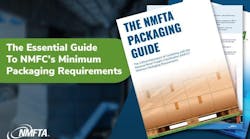Despite uneven economic data of late, especially a weaker-than-expected job report for March and a falloff in manufacturing activity, the trucking industry should remain strong as freight levels are predicted to stay elevated in the near term.
“We continue to believe that 2015 will be somewhat of a transition year for carriers as freight flows appear to be less disrupted than in 2014,” John Larkin, managing director and head of transportation research for Wall Street investment firm Stifel Nicolaus & Co. explained in a recent research report.
“The West Coast port delays should be cleared up by mid-2015 while some displaced [oil] shale workers are re-entering the driver labor pool,” he added.
Larkin also pointed out that shale-based energy, near-shoring and in-sourcing of manufacturing activity back to North America, coupled with more e-commerce growth, will help freight volumes grow faster than the rate of U.S. gross domestic product (GDP) growth this year.
“At the margin, those phenomena will generate incrementally more ground parcel, last mile delivery, LTL, and outsourced contract logistics opportunities for carriers and logistics companies serving these service segments,” he stressed.
For those reasons, Larkin still expects 2015 to be a good year for trucking, with 2016 marginally better than 2015, though it may be “difficult” in his words for some carriers to replicate the contract price increases they received in 2014.
Part of that difficultly may stem from mixed economic indicators of late.
Lindsey Piegza, chief economist for research firm Sterne Agee, noted that last Friday's employment report “was downright disappointing,” with non-farm payrolls only rising by 126,000 in March – the weakest monthly gain since December 2013 – while January and February payrolls were revised downward for a net revision loss of 69,000 positions.
She added that the Institute for Supply Management’s (ISM) non-Manufacturing Index fell slightly from 56.9 to 56.5 in March as well, and while that decline was expected, service activity has now fallen to a three-month low.
Business momentum overall remains mixed according to ISM data points, she stressed:
- Business activity slowed from 59.4 to 57.5 at the end of the first quarter, the slowest pace in a year.
- Supplier deliveries declined from 55.0 to 54.0.
- However, new orders rose from 56.7 to 57.8 in March, and backlog of orders rose minimally to 53.5 from 53.0, as did employment, gaining two-tenths to 56.6.
- Additionally, new export orders increased from 53.0 to 59.0 in March, while imports improved from 51.0 to 55.5; a five-month high.
Optimism also remains “resilient” for many companies as well, according to Sanford Cockrell III, national managing partner with global consulting firm Deloitte LLP.
For example, he said Deloitte’s quarterly CFO Signals survey, which polled 96 chief financial officers (CFOs) at companies with over $1 billion in annual revenues, found that net optimism increased quarter-on-quarter from +33.3% to +34.4% with many continuing to forecast significant growth in earnings and hiring.
"This quarter suggests that optimism among CFOs is resilient," said Cockrell. “While new uncertainties like currency fluctuations and market shifts became elevated, sentiment continues to hold strong."
He added that though revenue growth expectations receded among the CFOs polled by Deloitte, those “expectations” are still better than they were a year ago. In total, 79% of those CFOs in the survey expect year-over-year gains in earnings.
Stifel’s Larkin also continues to believe that even if freight growth does slow down, trucking should still be poised to benefit as regulatory initiatives planned by the Federal Motor Carrier Safety Administration (FMCSA) over the next two years will further tighten already scarce capacity.
“We assume that FMCSA's regulatory agenda will not be further delayed and that final rule makings for electronic logging devices (ELDs) and speed limiters will be issued by the end of 2015,” he said – meaning both would be fully in place by the end of 2017.
“Therefore, by 2017 we expect that somewhere on the order of 5%+ of the industry's capacity will vanish as carriers will no longer be able to reduces unit costs by driving too many hours and by driving faster than the posted speed limits,” he explained. “This should create the beginnings of the ‘mother of all truckload capacity shortages’ by the second half of 2017.”
As a result, Larkin predicts that TL freight will “spill over” into the LTL sector in a more pronounced way, with intermodal volumes continuing to grow as truck lines and railroads forge “deeper and more collaborative” relationships.
“Railroads will handle a larger portion of the truckload freight moving in long-haul high density lanes, thereby freeing up scarce compliant drivers to serve the shorter haul, less dense markets that cannot typically be handled economically via rail intermodal,” Larkin said.



